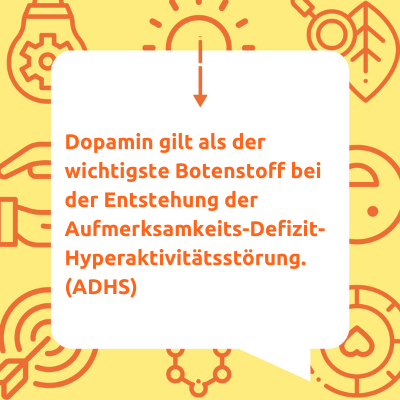What does ADHD have to do with serotonin, dopamine and GABA?
Attention deficit hyperactivity disorder (ADHD for short) is characterized by impaired attention and concentration, impulsivity and hyperactivity. The causes of the disorder, which usually appears for the first time in childhood and adolescence, have not yet been conclusively researched. According to the current state of science, however, it is a neurobiological disorder in which the communication between the nerve cells in the brain is disturbed.
ADHD and neurotransmitters
In the communication between nerve cells, the messenger substances (neurotransmitters), which are responsible for the transmission of information, play an important role. The best-known neurotransmitters include dopamine, serotonin and GABA, which are apparently not present in sufficient quantities in ADHD.
ADHD and dopamine

Dopamine is considered the most important neurotransmitter in the development of attention deficit hyperactivity disorder. Apparently, the release of dopamine is disturbed in affected individuals or the messenger substance is broken down too quickly, so that the transmission of information is disturbed. As a result, stimuli cannot be filtered well, which leads, among other things, to thoughts that have already been started not being completed, for example, but being disturbed by ever new thoughts [1]. This is also supported by the fact that drugs that increase dopamine levels can improve symptoms [2].
In addition, the neurotransmitter serotonin - which is responsible for impulse control, among other things - also appears to play a role in ADHD.
ADHD and serotonin
The neurotransmitter serotonin is involved in mood regulation, among other things, but is also very important for sleep and social behavior and memory functions. Too low a serotonin level can impair these functions. There is evidence that chronic serotonin deficiency can trigger symptoms of attention-deficit hyperactivity disorder, and increasing serotonin by administering tryptophan (the precursor of serotonin) can alleviate the impulse control and hyperactivity problems typical of the disease [3]. However, dopamine and serotonin do not act independently, so it is conceivable that in conditions such as attention deficit hyperactivity disorder, the cooperation between the two neuronal systems may also be impaired [4].
ADHD and GABA

Gamma-aminobutyric acid (GABA) is the main inhibitory neurotransmitter in the brain. Its role is to reduce the excitability of neurons, which has a calming, anxiety-relieving, and relaxing effect on the body. In one study, adult patients with ADHD were found to have higher impulsivity scores but lower GABA levels than healthy controls [5]. Lower brain GABA concentrations were also measured in children with ADHD than in a control group of the same age [6], suggesting that the disorder is associated with a GABA deficit.
Conclusion
The development and symptoms of attention deficit hyperactivity disorder appear to be related to a disturbed balance of neurotransmitter systems in the brain. Studies suggest that dopamine, serotonin, and GABA are particularly important and that increasing the level of each neurotransmitter can improve symptoms.
Sources
[1] https://www.kinderaerzte-im-netz.de/krankheiten/adhs-aufmerksamkeits-defizit-hyperaktivitaets-stoerung/ursachen/
[2] https://adhs-muenchen.net/adhs-bei-erwachsenen/stand-der-forschung/
[3] https://pubmed.ncbi.nlm.nih.gov/25684070/
[4] https://pubmed.ncbi.nlm.nih.gov/18772050/
[5] https://pubmed.ncbi.nlm.nih.gov/26040503/
[6] https://pubmed.ncbi.nlm.nih.gov/22752239/














